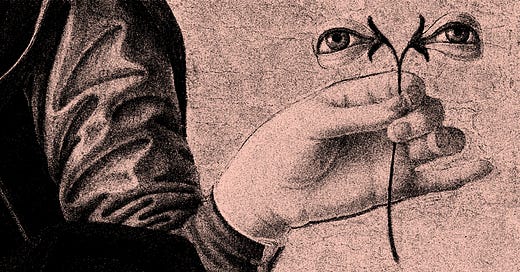The Eye Of The Beholder Got A Blepharoplasty
A quick thought on what we find beautiful and why.
I’m just back from presenting at HowTheLightGetsIn in Wales. What an incredible experience, to be in conversation with philosophers, ethicists, scientists, and speakers so much smarter than I. I feel stretched, expanded — filled with the emptiness of aspiration! Alive with the knowledge that I know nothing!
One of the panels I was part of debated the question, “Should we abandon the idea that beauty is in the eye of the beholder?” I thought I’d share some of my notes with you here.
I do think we should abandon the idea that beauty is in the eye of the beholder. Not because it’s not true — it may be, in some instances, for some types of beauty — but because it’s not currently useful to the projects of human flourishing, wellbeing, and equality.
I would argue that the dominant understanding of beauty today comes from beauty culture. (Google “beauty” and Ulta.com is the first result; the “beauty” section of a pharmacy or department store does not sell beautiful art or music or flowers, but products to bring the face and body into closer alignment with physical appearance ideals1.) I would also argue that participation in the beauty industry is, to some degree, compulsory (for women and gender non-conforming people in particular, but increasingly, as the beauty industry grows, for men too). I’m not talking about a feature-for-feature imitation of a Hollywood star or something — I’m referring to tasks that are so integrated into public-facing femininity and presentability that they may seem inconsequential or even natural, but are indeed effortful and expensive performances of beauty: Shaving legs and armpits. Shaping eyebrows. Getting a blowout. Dyeing grays. Polishing nails, bleaching facial hair, whitening teeth. Wearing “professional” makeup. Maintaining a certain weight or shape, or dressing in a way that disguises a certain weight or shape.
Research shows those who do not meet this standard of beauty can face social, financial, and political consequences. Beauty, then, “is the kind of good which makes life go better or worse,” philosopher Heather Widdows writes.
The physical ideal that we are measured against is not determined by any one individual’s preferences, or any one beholder’s eye, but has been shaped over centuries by oppressive political forces: patriarchy, white supremacy, colonialism, and capitalism. (From Tressie McMillan Cottom: “Beauty isn't actually what you look like; beauty is the preferences that reproduce the existing social order.”) It is clearly and constantly communicated to us through film, television, literature, magazines, the education system, the medical system, the legal system, personal relationships, social media, and advertising. We internalize it. Psychologists have posited that it may be all but impossible to separate what we might individually find beautiful from what society tells us is beautiful.
Whether or not one engages in beautification, beauty standards inspire shame. “Our culture is constantly telling us that our bodies are never good enough,” says philosopher Clare Chambers. “This shame that we are encouraged to feel about our bodies is in itself a public health issue.”
For these reasons, I tend to reject statements like “Everybody is beautiful”, and I worry that “Beauty is in the eye of the beholder” can function in the same way. These platitudes — often invoked by cosmetic companies to sell products that perpetuate a prescriptive ideal — can limit our capacity to discuss the politics of physical beauty. Because if “everyone is beautiful”, if “beauty is in the eye of the beholder”… then how can anyone truly be oppressed by cultural demands to perform beauty? Do the consequences of not performing beauty truly exist?
Additionally, I think that today, the “eye of the beholder” is turned toward the self more than at any other point in human history. Mirrors, Zoom windows, selfies — all enable a level of self-surveillance and train us to judge our own so-called beauty. Data shows that children as young as five worry about being ugly, and seek to make themselves more attractive according to the dominant ideal. Their personal eye for beauty is hardly developed; they’ve already adopted the eye of society.
Rather than insist “Beauty is in the eye of the beholder”, it might be more beneficial to demystify the standard of beauty — to admit that it is not our own, but a construct created without our consent — and instead center questions like, “What shapes beauty?” and “What shapes the eye?”
I would also argue that beauty culture’s definition of beauty is not beauty (multi-dimensional, immortal, connects you to something outside of and larger than yourself) but appearance (one-dimensional, corporeal, often individualistic, a facet of beauty but not beauty in and of itself). But unfortunately, the word we use for this is beauty, and so in order for philosophy to adequately address concepts like “Beauty is in the eye of the beholder”, it must confront how beauty is functioning in the real world for real people today, not only in theory, but materially. And that is primarily through appearance.




I lol’d at the title of this article 😭
I thought of this substack immediately a few months back. A local plastic surgeon had an advert with the slogan "you can buy beautiful". Or something nearly like that. "April always hated her nose and didn't do anything. Sally changed her nose and now she is beautiful. You can buy it, too"
Not verbatim, I cannot remember the exact words. However, it was 100% along those lines.
I was horrified! I already have severe issues with how I perceive my appearance. I was furious.
I kept trying to find it to share, but I could not remember what it was called.
Unsurprisingly searching "plastic surgery ugly beautiful" did not help.